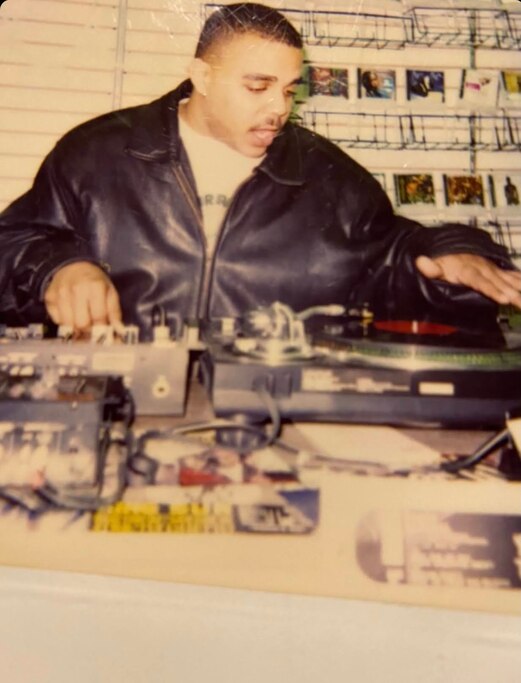For many attendees, the AFRAM festival this weekend will be about seeing performances from the legendary Isley Brothers and Ty Dolla $ign. For a lot of Baltimore natives, though, the highlight will be witnessing pioneers of the club scene perform Saturday in honor of the inaugural Baltimore Club Music Day.
Originating around 30 years ago, Baltimore club music has long been a staple of the city’s culture and has reached even further across the nation. Influenced by the U.K. breakbeat and house music genres, the infectious sound is a sample-based production and uses tempos ranging anywhere from 120 to 135 beats per minute. The up-tempo tracks lend themselves well to dancing and have helped create a sense of community among listeners.
It’s that same culture, community and excitement that Mayor Brandon Scott wants to honor Saturday during the first official celebration.
Scott gives credit to two pioneering DJs, Shawn “Ceez” Caesar and Scott “Scottie B.” Rice, both of Unruly Records, for coming to him with the idea to pay homage to the legacy and evolution of Baltimore club music.
The Baltimore Banner thanks its sponsors. Become one.
“This was a perfect time for us to celebrate the entire history — 30 years-plus of that history — and what better place to do that than at Baltimore’s festival, Baltimore’s favorite festival, Baltimore’s Blackest festival, AFRAM,” Scott said.
Saturday will feel like a family reunion for Scott, who looks up to some of the originators such as Caesar and DJ Rod Braxton like uncles. The mayor grew up in Baltimore club music culture and used to carry vinyl records into Paradox, the former dance club, where he got to witness and learn firsthand the craft of mixing from other influential DJs. It led him to become a DJ himself, using the skill to pay his bills and college tuition.
The genre “was really a part of our culture that helped us escape everything and it was something that was ours,” Scott said. “D.C. has their go-go, other folks have their other stuff. We had our club music and it was something that was unique to Baltimore.”

That escapism was also felt by Daniel “DJ Class” Woodis Jr., who was originally a breakdancer more interested in hip-hop before stumbling onto club music.
“The element of being able to do something that’s raw and uncut was a release for me. That was big adrenaline for me to be able to put together or even just play a DJ or go to the club and hear somebody playing some stuff that’s gotten my adrenaline going. It was hard. These records was hard back then,” Woodis recalled. “Those records really, they did a number on these people. These people was like — addicted to these drums, these bases, and you know, the raw element of not needing to be on radio as well.”
The Baltimore Banner thanks its sponsors. Become one.
Generations after still feel the same energy and sense of release that those pioneers worked so hard to create.
“Baltimore club music is like another element of freedom of expression,” said DJ and artist Charles “Blaqstarr” Smith.
Smith became fascinated with music after coming across rap magazines at age 5. At 14, he became a DJ that would spin at neighborhood parties for $80 a week. By 16, Smith decided to get into producing and in turn, contributed even more originality to the scene.
“The genre is so easily digestible that it’s almost hypnotizing,” Smith said. “A club beat could be the most simple thing, but with the way that it’s arranged, you would want to play it over and over again.” Smith is responsible for creating some of the genre’s most popular tracks, including “Shake It to the Ground” (with the multifaceted Ryeisha Berrain, more popularly known as Rye Rye), “Rider Girl,” and “Hands Up Thumbs Down.”
Prior to stealing scenes in the 2012 film “21 Jump Street” (and providing the main theme for the soundtrack), Rye Rye could frequently be heard throughout speakers in Baltimore. She was focused on dance growing up in East Baltimore’s Chapel Hill housing projects, but found a career elsewhere once Blaqstarr asked her older sister if the uniquely voiced Rye Rye knew how to rap.
The Baltimore Banner thanks its sponsors. Become one.
Rye Rye credits club music for her successes since. When she met Kanye West in 2011 at Coachella, he sung “Shake It to the Ground” to her. “That was so crazy,” she said. “I was just there thinking like ‘Wow, Kanye really knows my song.’ That just shows how far Baltimore club music can go.”
To this day, the locally grown genre holds a strong influence throughout the world. Elements of its songs can be heard on albums by renowned artists such as Beyoncé and Drake, and dances derived from its most popular songs have frequently gone viral. Baltimore takes pride in its community so the recognition is meaningful not just to those who had firsthand experience being involved in the club music culture, but also to the city’s natives who just simply enjoy it.
“Seventeenth of June is gonna be one of the days where we get that opportunity to leave a mark on the world, something where they can be loud and proud,” Woodis said. “Your grandkids can be loud and proud about who you were and what you did.”



Comments
Welcome to The Banner's subscriber-only commenting community. Please review our community guidelines.